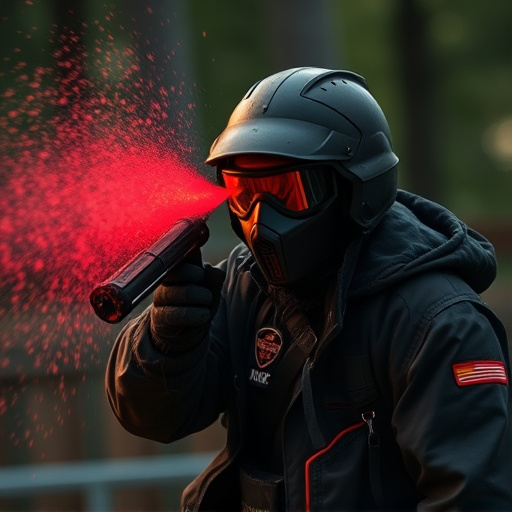Pepper spray, composed mainly of capsaicin, temporarily disables attackers by irritating eyes and respiratory systems, providing users with escape moments. Contrary to belief, it doesn't cause permanent blindness or burns but clears vision after a few seconds. Effective for decades in law enforcement and civilian self-defense, its use is legally restricted globally; understanding local laws, safety precautions (training, spray range awareness, avoiding direct eye contact), and responsible usage are essential to avoid health issues. Misuse can lead to temporary blindness and respiratory distress.
Defensive spray has emerged as a powerful tool for civilian protection, offering a non-lethal means of deterring potential threats. This article delves into the world of pepper spray, exploring its effectiveness and dispelling common myths surrounding its use. We examine whether pepper spray can truly blind you, dissecting legal considerations and safety precautions for responsible civilian usage. Get equipped with knowledge to make informed decisions about personal protection.
- Understanding Pepper Spray: The Basics and Its Effectiveness
- Is Pepper Spray Blindening? Debunking Common Myths
- Civilian Use of Pepper Spray: Legalities, Safety Precautions, and Best Practices
Understanding Pepper Spray: The Basics and Its Effectiveness
Pepper spray, a popular self-defense tool for civilians, is designed to disable an attacker temporarily and give users time to escape dangerous situations. Understanding its basic mechanism and effectiveness is crucial for anyone considering it as a protective measure. Unlike common misconceptions, pepper spray does not aim to blind its target; instead, it irritates the eyes, nose, and respiratory system by provoking a severe burning sensation. This reaction leads to temporary blindness and difficulty breathing, allowing users to retreat and call for help.
The effectiveness of pepper spray lies in its ability to disrupt an assailant’s balance and coordination while causing enough discomfort to avoid further aggression. However, its success depends on factors such as proximity, wind direction, and the attacker’s tolerance to capsaicin, the active ingredient. Despite occasional debates about its blinding capabilities, pepper spray remains a powerful tool for personal safety when used appropriately, ensuring users have precious moments of clarity and mobility amidst chaos.
Is Pepper Spray Blindening? Debunking Common Myths
Many people wonder if pepper spray can blind you, a concern that’s only heightened by misinformation and urban legends. The truth is, while pepper spray is an incredibly effective non-lethal self-defense tool, it does not typically cause permanent blindness. The active ingredient in most pepper sprays, capsaicin, irritates the eyes and respiratory system, causing temporary disorientation and pain. This can make it difficult to see or breathe for several minutes, giving users time to escape from a dangerous situation.
Contrary to popular belief, pepper spray does not burn the eyes or cause permanent damage. The blinding effect is merely a temporary reaction to the irritant. In fact, law enforcement officers and civilians alike have relied on pepper spray as a safe and effective deterrent for decades. By understanding how it works—and dispelling common myths—people can feel more empowered to protect themselves in potentially dangerous situations.
Civilian Use of Pepper Spray: Legalities, Safety Precautions, and Best Practices
The civilian use of pepper spray, also known as oleoresin capsicum (OC) spray, has gained popularity for personal protection against potential threats. However, understanding its legalities, safety precautions, and best practices is essential before considering it as a self-defense tool. In many jurisdictions, civilians can legally carry pepper spray for self-protection, but regulations vary widely from state to state or country to country. It’s crucial to research and comply with local laws to avoid any legal repercussions.
Safety precautions are paramount when using pepper spray. Proper training is necessary to ensure effective and safe deployment. Users should be aware of the range and potency of the spray; generally, a 2-3 second blast at close range (around 2-3 feet) is recommended. It’s important to remember that pepper spray can cause temporary blindness, even in low concentrations, so users must avoid aiming it at the eyes directly. Proper ventilation is also critical, as breathing in the irritant can lead to respiratory distress or other health issues. Following manufacturer instructions and practicing responsible usage are key to mitigating risks associated with civilian use of pepper spray.
Pepper spray has established itself as a valuable tool for civilian protection, offering a non-lethal means of deterring potential threats. While concerns about blindness persist, research and real-world applications demonstrate that its effects are temporary and rarely permanent. When used responsibly and in accordance with legal guidelines, pepper spray can empower individuals to protect themselves effectively. Understanding its mechanics, following safety precautions, and adhering to best practices are essential to ensuring its reliability as a personal defense mechanism.
